Four tire shop safety tips from TIA
Finding quality technicians is hard, and so is keeping them around, but ensuring your shop environment is safe is one step you can take to make their job easier.
Personal protective equipment is important, but it shouldn't stop there. Using all tools available to you as a manager is key to keeping your employees safe. While sometimes it can seem like pestering to have to remind techs to wear their PPE or follow the safety guidelines, ultimately it's for the best.
Fleet Maintenance affiliate Modern Tire Dealer recently got a chance to speak with Kevin Rohlwing, chief technical officer for the Tire Industry Association, regarding some of his thoughts on safety around tires and in the shop.
"If you've got a good relationship with your employees and they understand that you're not doing it for any reason other than protecting them and getting them home at the end of the day in the same condition they came to work in," he said, "I think that's what it comes down to."
Here are some of Rohlwing's tips for keeping your employees safe around tires.
1. Require appropriate footwear
According to OSHA, employees should wear appropriately protective footwear to prevent foot injuries when working around falling or rolling objects, and as Rohlwing pointed out, tires roll.
"At a minimum, I would say leather work boots or shoes with non-slip soles," Rohlwing recommended, which also helps prevent injuries due to slips and falls.
While a steel toe may not be required in every shop, it's definitely a good idea when dealing with commercial vehicles.
"If you drop a truck rim on your foot, you're gonna probably do a little more than break your foot."
2. Enforce use of safety glasses
Eye protection is an obvious choice during certain high-risk activities, like grinding or cutting metal, but the best way to stay safe is to keep them on whenever possible.
Rohlwing noted that disposable and plastic eyewear often gets a bad rap due to their tendency to fog up, get scratched, etc., but that this is not an acceptable excuse for neglecting eyewear completely.
"That's the first thing I hear from every technician: 'Well, I can't see with these things on,'" he said. "So, buy a better protective eyewear, right?"
He recalled a story from a plumber who typically kept safety front of mind, but only slipped up on one occasion.
"One day, on one job, he lifted up his glasses to look down a pipe, and something shot out and permanently blinded him for the rest of his life," Rohlwing said, "and it was a message that it can happen to anybody."
3. Implement a safety program
Rohlwing emphasized that aside from keeping specific equipment on hand, implementing a company-wide, comprehensive health and safety program is another important aspect of overall safety.
"There needs to be a program and then there needs to be someone who's responsible for enforcing that program," he explained. "If I have to walk up to you every day and tell you to wear your safety glasses, it's going to get old after time, but at some point, you're just going to say, 'look, this is the policy.'"
4. Enroll employees in training
Guiding your technicians is one thing, but giving them the know-how they need to keep themselves safe is one of the best ways to do so, if not for their safety, for the safety of your customers.
"When a wheel comes off or you get some kind of an accident that involves injuries, they're going to want to know who did the work," Rohlwing commented. "Was that person qualified?"
Online universities like TIA offer dedicated modules for every aspect of safe repair, and can ensure that your employees are protecting themselves while keeping the safety of your customers in mind.
"I've been through enough civil lawsuits over the course of my career now to know that a well-trained employee is very defendable," Rohlwing concluded, "and an employee that is not well trained is much harder to defend."
For more tips, check out the full podcast with Rohlwing and Fleet Maintenance affiliate Modern Tire Dealer here.
About the Author

Lucas Roberto
Lucas Roberto is an Associate Editor for Fleet Maintenance magazine. He has written and produced multimedia content over the past few years and is a newcomer to the commercial vehicle industry. He holds a bachelor's in media production and a master's in communication from High Point University in North Carolina.
